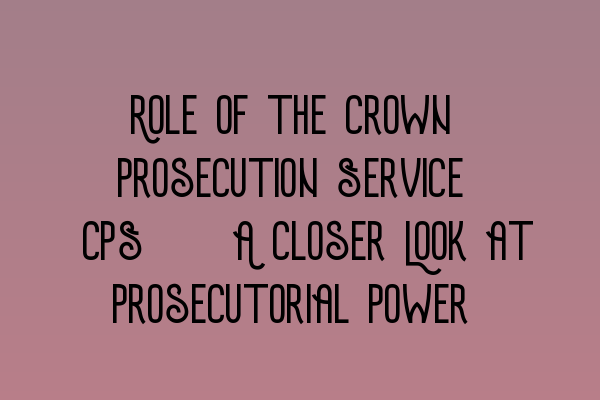Role of the Crown Prosecution Service (CPS): A Closer Look at Prosecutorial Power
Welcome to SQE Criminal Law & Practice Law UK! In this blog post, we will delve into the role of the Crown Prosecution Service (CPS) and explore its significant role in the criminal justice system. As a key player in the prosecution process, the CPS plays a pivotal role in upholding the rule of law and ensuring fairness and justice in criminal proceedings.
The Crown Prosecution Service: An Overview
The Crown Prosecution Service is an independent authority responsible for criminal prosecutions in England and Wales. Its primary function is to make fair and impartial decisions about whether criminal cases should be prosecuted and to oversee their progress through the courts.
With the CPS’s commitment to justice, it is crucial for legal professionals and aspiring solicitors to understand the various aspects of the CPS’s role and the power it holds. Let’s take a closer look!
1. Investigative Considerations
The CPS works closely with law enforcement agencies, such as the police, to assess and determine whether there is sufficient evidence to prosecute an individual or entity. Through a thorough review of the evidence gathered during the investigation, the CPS considers crucial factors such as:
- The relevance and admissibility of evidence
- The credibility of witnesses
- The public interest in pursuing the case
- The probability of securing a conviction
This critical evaluation ensures that only cases with a reasonable chance of success proceed to court, minimizing the chances of wrongful convictions and unnecessary court proceedings.
2. Making Charging Decisions
Once the investigation is complete, the CPS makes charging decisions based on the available evidence. These decisions are made independently, without any undue influence from external parties.
The CPS considers the seriousness of the alleged offense and the evidence at hand to determine the most appropriate charges to bring against the accused. This careful decision-making process plays a significant role in ensuring that the charges reflect the nature and extent of the alleged crime.
If the CPS determines that there is insufficient evidence to bring charges, the case may be discontinued. However, this decision does not prevent law enforcement agencies from further investigating the matter if new evidence arises.
3. Preparing and Presenting the Case
Once charges have been laid, the CPS works closely with the prosecution team to prepare and present the case in court. This includes gathering relevant evidence, reviewing witness statements, and liaising with witnesses and experts.
The CPS also takes responsibility for ensuring that victims have the necessary support, and that their rights are protected throughout the criminal justice process.
Are you interested in expanding your expertise in criminal practice? Check out our Workshops and Seminars on Criminal Practice: Expanding Your Expertise for valuable insights and knowledge.
4. Court Representation and Advocacy
In court, CPS prosecutors play a fundamental role in presenting the case effectively. Their advocacy skills, legal knowledge, and ability to articulate complex legal arguments are key to securing convictions, ensuring fair trials, and protecting the public interest.
The CPS prosecutors handle various legal proceedings, ranging from the Magistrates’ Court to the Crown Court and beyond. Their role encompasses conducting examinations and cross-examinations, presenting evidence to the court, and providing legal submissions.
Stay informed and prepared with updates in UK criminal laws. Discover the latest changes and developments in legislation by visiting our article on Updates in UK Criminal Laws: Staying Informed and Prepared.
5. Safeguarding the Rights of Victims
While the CPS focuses on prosecuting alleged offenders, it also takes great care to safeguard the rights of victims. The CPS works diligently to ensure that victims are treated with respect, receive proper support, and have their voices heard throughout the legal process.
Victims of crime have the right to access information about their case, provide input during key decisions, and be informed of the progress and outcome of their case. The CPS strives to ensure that victims’ rights are respected and that they are protected from further harm.
Enhance your SQE criminal law study group experience and further your understanding of criminal procedures by reading our article on Enhancing Your SQE Criminal Law Study Group Experience.
Conclusion
The Crown Prosecution Service plays a critical role in the criminal justice system by ensuring that prosecutions are fair, robust, and in the public interest. Its power and responsibility in making charging decisions, preparing and presenting cases, and safeguarding the rights of victims are paramount to maintaining justice and upholding the rule of law.
To learn more about criminal practice, legal updates, and other related topics, visit SQE Criminal Law & Practice Law UK. Stay informed, expand your expertise, and be prepared for the challenges of a career in criminal law!
Decoding criminal evidence rules is essential for any legal professional. Gain a detailed analysis of this crucial aspect by exploring our article on Decoding Criminal Evidence Rules: A Detailed Analysis.
Ensuring the rights of victims in criminal procedures is of utmost importance. Learn more about the legal protections and support available for victims by reading our comprehensive article on Ensuring Rights of Victims in Criminal Procedures: Legal Protections and Support.
